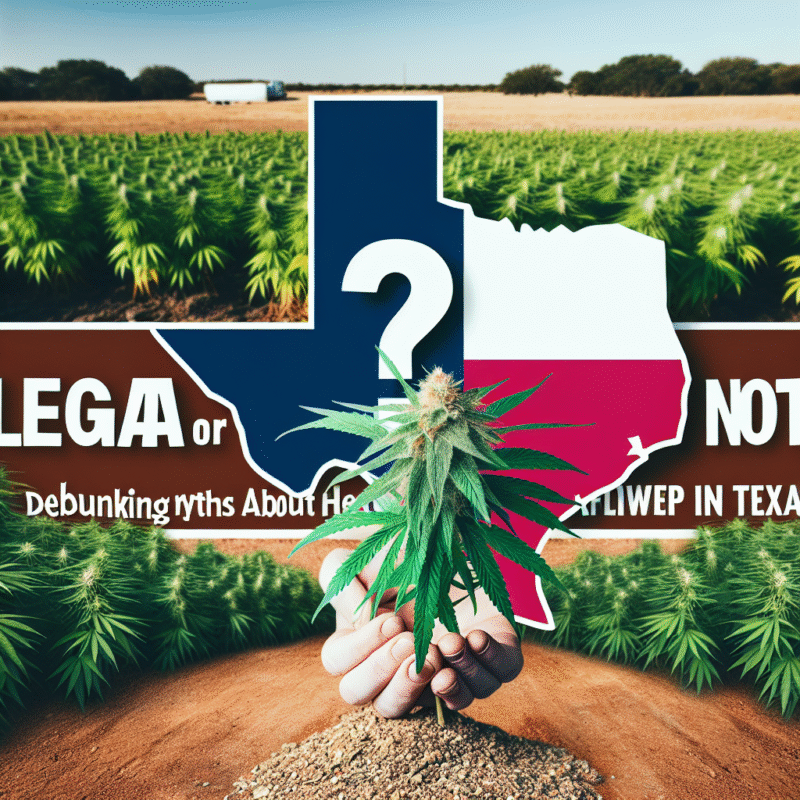Legal or Not? Debunking Myths About Hemp Flower in Texas
In recent years, the discussion around hemp and its derivatives has gained significant traction, particularly in states like Texas. As the market continues to evolve, misconceptions regarding the legality of hemp flower proliferate. This article seeks to clarify the legal status of hemp flower in Texas, debunk common myths, and shed light on the implications for consumers and businesses alike.
Understanding Hemp and Hemp Flower
Hemp is a strain of the Cannabis sativa plant that is cultivated predominantly for industrial purposes. It contains less than 0.3% tetrahydrocannabinol (THC), the psychoactive compound found in marijuana. Hemp flower refers to the flower buds of the hemp plant, which can be used for various applications, including CBD extraction, wellness products, and more.
The distinction between hemp and marijuana is crucial, particularly when navigating legal landscapes in the United States.
The Legal Framework in Texas
In June 2019, Texas passed House Bill 1325, legalizing the production and sale of hemp and hemp-derived products, provided they contain less than 0.3% THC. This legislation aligns with the federal Farm Bill of 2018, which removed hemp from the controlled substances list. As a result, hemp flower is legal in Texas, but this legal status comes with specific conditions.
Common Myths About Hemp Flower in Texas
Myth 1: All Cannabinoids in Hemp Flower Are Illegal
Truth: While THC is heavily regulated, many cannabinoids derived from hemp, such as CBD, are legal in Texas as long as they comply with the THC threshold. Hemp products, including those containing CBD, have surged in popularity, and consumers can access a variety of hemp flower products legally.
Myth 2: Hemp Flower Gets You High
Truth: Hemp flower typically contains negligible amounts of THC (less than 0.3%), preventing it from producing the psychoactive effects associated with marijuana. While it can provide therapeutic benefits due to CBD and other cannabinoids, it does not cause the "high" that marijuana does.
Myth 3: Law Enforcement Will Confiscate Hemp Flower
Truth: Law enforcement in Texas is generally educated about the difference between hemp and marijuana. However, confusion can arise in situations where the two are improperly distinguished. Using lawfully obtained hemp flower that adheres to legal standards can reduce the risk of confiscation.
Myth 4: Using Hemp Flower is the Same as Using Marijuana
Truth: While both hemp and marijuana originate from the cannabis plant, they are different in composition and effects. Hemp flower is primarily sought for its CBD content and lacks the psychoactive properties of marijuana. Therefore, using hemp flower is not equivalent to consuming marijuana.
Myth 5: There Are No Restrictions on Hemp Flower Sales
Truth: While hemp flower is legal, there are regulations governing its sale. Retailers must ensure that their products are tested for THC content and comply with labeling requirements. Additionally, some local jurisdictions may have their own regulations regarding hemp sales.
The Future of Hemp in Texas
As the hemp market continues to grow, education and awareness will play critical roles in shaping public perception and legal interpretations. Both consumers and industry stakeholders must stay informed about evolving laws and regulations. Advocating for further clarity can help ease misconceptions and support the responsible use of hemp flower.
Conclusion
In conclusion, the legalization of hemp flower in Texas marks a significant shift in the cannabis landscape. While myths and misunderstandings persist, the legal framework allows for a legitimate market for hemp products. By staying informed and advocating for fair regulations, both consumers and businesses can thrive in this burgeoning industry, free from the shadows of outdated misconceptions. With proper knowledge, Texans can confidently explore the potential benefits of hemp flower while ensuring compliance with the law.

